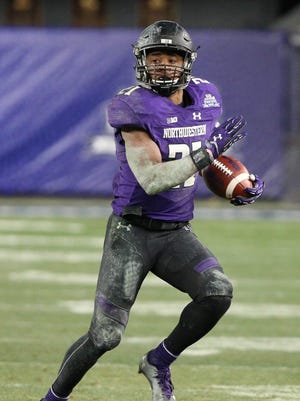RB Justin Jackson, who carries the load for Northwestern, knows how to miss the hits

EVANSTON, Ill. — Justin Jackson likes purple — it’s kind of a requirement for a Northwestern football player, for obvious reasons — but not purple jerseys.
A purple jersey is what a Wildcats quarterback wears at practice; it signifies no contact. For a running back who craves contact and carries, it is not ideal. Even for a running back who, over the past three seasons, has more combined carries and catches than any other player in a Power Five conference. Jackson isn’t one to take it easy, even when it makes total sense to try to do so.
“He doesn't like it at all,” says Northwestern coach Pat Fitzgerald, chuckling. “I mean, he's already taken enough hits. We don't need to compound that with what we're doing in practice. Now, when we do pass pressure (situations), we'll do that live. He'll do all that stuff, and there will be contact in that, but carrying the ball and all that, no.”
Jackson was required to wear the purple jersey at practice early last season, and it’s something that’s continued as he prepares for this fall, his senior season. And, certainly, Jackson understands why he’s doing this — the running back who played last season at 5-11, 190 pounds does not have the same build nor necessarily durability as the big, bruising, by-committee backs he often sees on opposing sidelines.
Big Ten announces new TV deals with Fox, ESPN and CBS
Hugh Freeze's fall reminds again we should stop turning football coaches into demigods
Peterson: NCAA didn't go far enough with football's new early signing period
“The coaches know the workload I'm probably going to get during the year, and they're just trying to make sure that I'm healthy,” Jackson says. “It sucks when you're doing it because you want to be out there practicing and competing and everything. You kind of feel like you're sitting on the sideline. I hate it so much, but then you look back on it in hindsight, and it's probably the right decision.”
It’s right for the obvious reasons, the wear and tear of a college football season. But it’s especially right considering Jackson’s size and frame.
“I can't even believe I played my freshman year; I was probably only 185 pounds and that's crazy,” Jackson says. “It is amazing that I didn’t get seriously injured at least that year."
Jackson, who will be among a handful of stars participating Tuesday at Big Ten media days in Chicago, says he’s put on about 15 or so pounds since arriving on Northwestern’s campus, up to 200 now, which has helped him both absorb hits and also deliver them.
And besides, part of what turns a good running back into a great one is the avoidance of such hits in general — something Jackson has always been naturally good at doing.
“He has a really, really uncanny ability or unique ability not to get hit,” Fitzgerald says. “Very rarely do you see him just get flush hit. He's able to get skinny, so to speak, and really plays behind his pads well. He's really able to contort himself where he doesn't really ever get lit up, and I think that's really helped.”
Jackson says his body can’t really feel the difference between a 25-carry game and a 35-carry game, though he knows “the miles add up” as a running back. He tries to prepare his body during fall camp the best he can — create a “callus” of sorts, as he puts it — to be ready for the first game of the season. Beyond that, he’s learned how to better take care of his body before games and during recovery afterward.
It’s all part of a larger education Jackson has received here, one that will eventually end, alongside an exceptional football career, with a degree in economics and minors in business and French. Jackson, who also is on the football team’s leadership council and an athletic department-wide student-athlete group geared toward diversity and inclusion, comes across as one of the most well-rounded college athletes imaginable.
And he is, with a particular perspective and appreciation for what he gets to experience both here at Northwestern and each Saturday on various football fields throughout the Big Ten. He likes to talk about personal growth, and living in the moment. Jackson, whose mother died of breast cancer when he was 3 years old, uses that awful experience to highlight something positive: A closeness with his extended family that might never have existed without the loss of his mother.
“It definitely was like a wake-up call, my aunts always tell me,” Jackson says. “Now, everyone goes to my Grandma's house like every Sunday or Saturday or whatever, and just kind of makes that commitment to really cherish each other, cherish life, and really come together as a family.
“It's definitely bittersweet. It's a silver lining, but … there's definitely something you can take from everything. I wish I would've had more time, but life doesn't always work like that.”
“Her memory definitely lives on — through us.”